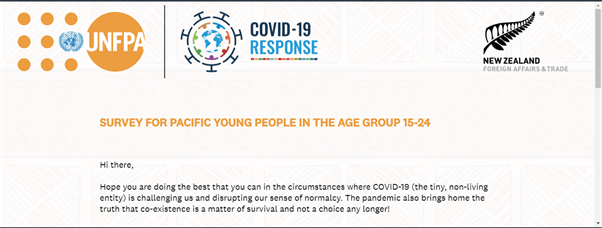The United Nations Population Fund (UNFPA) Pacific Sub-Regional Office, in collaboration with diverse youth networks, the Pacific Disability Forum, United Nations sister agencies, and with the support of key development partner, New Zealand, has launched a survey for Pacific young people in the age group of 15-24 years to share their impressions and observations on how the COVID-19 pandemic has influenced their lives.
This survey invites young people from 14 Pacific Island Countries and Territories (PICTs) to respond to questions on how COVID-19 is affecting different aspects of their lives. The survey findings will help in understanding the “new normal” from the youth perspective, their coping mechanisms, and their unique needs, to guide youth-responsive programming by different stakeholders. The findings will also highlight the agency and leadership of young people in addressing the pandemic and provide an opportunity in their shaping of the COVID-19 socio-economic impact assessments initiative led by the United Nations.
UNFPA Pacific Director Dr. Jennifer Butler said the resilience of young people and their ability to think out-of-the-box makes our world a better place. “COVID-19 related travel restrictions may have kept me thousands of kilometres away in New York, but the accounts of enthusiasm and positive energy of Pasifika ICPD25 Network, Pacific Youth Council, and the Pacific Disability Forum have convinced me that we will indeed build back better! “
Dr. Butler said this is no surprise to her as she had the honour to listen to the commitments made by the Pacific youth delegation at the Nairobi Summit on ICPD25: Accelerating the Promise in November 2019 - commitments to achieve full equality for women and girls, and of sexual and reproductive health and rights for all.
She said the Youth COVID-19 survey demonstrates the power of partnership and co-creation. “As the Chair of the Youth interagency team, UNFPA is happy to leverage the UN's collective strength to identify the unique concerns of young people and respond to them effectively. We really want and need to hear from young people across the Pacific. I encourage all partners, agencies, and organizations to reach out to youth networks in the Pacific so that as many young people, aged 15 to 24 years have the opportunity to participate in the survey - in both the online and offline options, be inclusive in the outreach so that young people from all communities have the opportunity to be included, leaving no one behind.”
"Information is necessary; but evidence-based information is what will advance youth development. Youth must be recognized beyond as mere respondents in surveys. The PYDF (2014-2023) emphasizes an inclusive rights-based approach to position youth as equal partners; only then will we be able to achieve a hallmark of progress for a sustainable Pacific,"
said Tahere Talaina Siisiialafia, Chairperson of the Pacific Youth Council.
The survey results will be used to help shape Pacific responses to COVID-19, alongside the findings of socio-economic impact assessments and will enable responses to common concerns of young people through multiple channels, such as newspapers, TV (chat shows), radio, and organization of seminars around issues that are of concern to young people. Importantly, the survey findings will celebrate and promote the resilience of young people, the great work they are doing in their communities, and increase advocacy for youth participation and leadership through amplifying youth expressions and youth voices.
The survey will be available until June 21, 2020, in both online and offline modes. The online data collection is through the Survey Monkey tool (https://www.surveymonkey.com/r/2JG8WPJ) whereas the offline data collection being proposed in the seven Pacific Island Countries where UNFPA has a field presence.
In this initiative UNFPA is supported by the UN Resident Coordinator Multi-Country Offices in the Pacific, Office of the High Commissioner for Human Rights (OHCHR), International Labour Organization (ILO), International Organization for Migration (IOM), Joint United Nations Programme on HIV/AIDS (UNAIDS), United Nations Children’s Fund (UNICEF), United Nations Educational Scientific and Cultural Organization (UNESCO), United Nations Development Programme (UNDP), UN Women, The Pacific Community (SPC), and the Pacific Girl.
UNFPA Pacific is leading the Inter-Agency Youth Working Group to identify and respond to common concerns related to youth-centric programming in the Pacific. UNFPA acknowledges that a young person can contribute in meaningful ways in the fight against COVID-19, and would like to encourage young people to stay positive, hopeful, and strong during this crisis.


